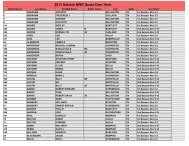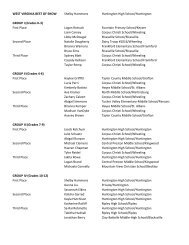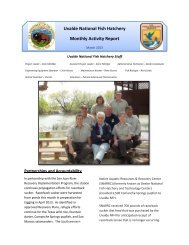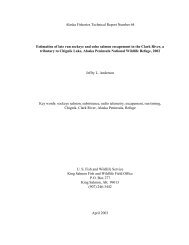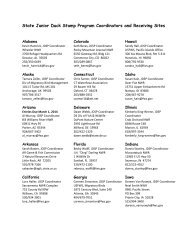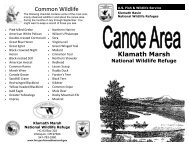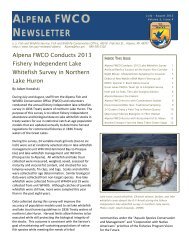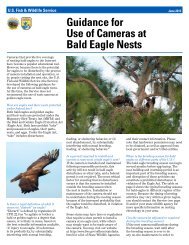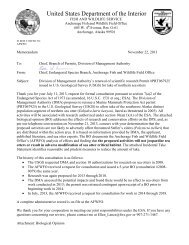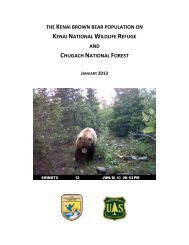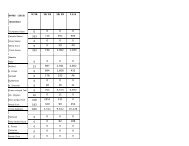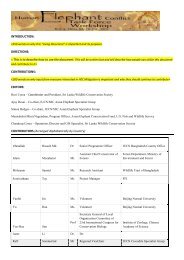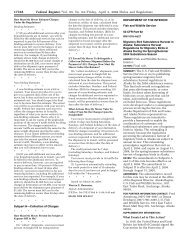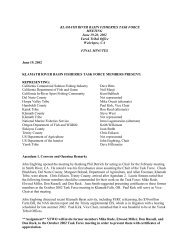Assabet River NWR Final CCP - U.S. Fish and Wildlife Service
Assabet River NWR Final CCP - U.S. Fish and Wildlife Service
Assabet River NWR Final CCP - U.S. Fish and Wildlife Service
You also want an ePaper? Increase the reach of your titles
YUMPU automatically turns print PDFs into web optimized ePapers that Google loves.
Appendix C: Responses to Substantive Comments<br />
whether hunting of an area of the refuge is consistent with or complements other hunted<br />
areas in surrounding towns.<br />
Hunting – Safety <strong>and</strong> Conflicts with Other Users<br />
There were a large number of individuals that expressed concerns about safety <strong>and</strong><br />
hunting. Some individuals expressed concerns about safety while using the refuge<br />
during hunting season <strong>and</strong> the assertion that the non-hunting public will not participate<br />
in other wildlife dependent activities during the hunting seasons. Other people indicated<br />
their concerns about the proximity to the refuge boundary of homes, schools, <strong>and</strong><br />
conservation areas. Additionally, individuals raised the possibility of hunters accessing<br />
non-refuge l<strong>and</strong>s or misguided arrows, shotgun slugs, or pellets injuring someone not on<br />
the refuge.<br />
There will be areas on the refuges where no hunting will be allowed. In some cases, these<br />
are highly used areas, such as the Concord Impoundments at Great Meadows <strong>NWR</strong>. In<br />
others, we have restricted hunting because of the m<strong>and</strong>ated safety zones. We realize that<br />
there may be people that will not visit the refuges during specific seasons. As mentioned<br />
previously, we have a responsibility to facilitate all forms of wildlife-dependent public use<br />
on the refuges, when possible, <strong>and</strong> there may be days when people engaged in hunting will<br />
have preferential access to parts of the refuges. National policy encourages refuges to<br />
follow state hunting regulations, but we do have the authority to set our own dates <strong>and</strong><br />
times if needed <strong>and</strong> we can limit the number of hunting permits issued. We will evaluate<br />
these options in the development of the Hunt Management Plan for each refuge, but do<br />
not anticipate a need to include such restrictions at this time.<br />
We strive to achieve a balance between consumptive <strong>and</strong> non-consumptive uses on the<br />
refuges. Because Massachusetts does not allow hunting on Sunday, at a minimum nonhunters<br />
will be free to enjoy our nature trails with no concern about possible hunting<br />
conflicts on those days during the hunting seasons. In addition, experience managing<br />
hunts both at Oxbow Refuge <strong>and</strong> at other refuges within the system shows that many<br />
areas can safely support both hunting <strong>and</strong> non-consumptive uses, such as wildlife<br />
observation, at the same time. We are confident that we can develop a hunting program<br />
that will safely provide opportunities for wildlife-dependent public use to a majority of our<br />
refuge visitors.<br />
We contacted the Massachusetts Division of <strong>Fish</strong>eries <strong>and</strong> <strong>Wildlife</strong> to obtain hunting<br />
accident statistics. We considered investigating such statistics in other states, but decided<br />
that Massachusetts has a higher population density than the majority of other states with<br />
readily available accident statistics such as Pennsylvania, North Carolina, <strong>and</strong> Texas.<br />
According to Massachusetts Law, any person involved in a hunting accident or any person<br />
with knowledge of a hunting accident must file a report with the state or local police, who,<br />
in turn, must file a report with the Division of Law Enforcement. The Massachusetts<br />
Environmental Police, Hunter Education Program reports hunting accidents in the<br />
Hunting Accident Report: 1995 – 2002. During the reporting period, there were 38<br />
hunting accidents. None of the accidents were fatal <strong>and</strong> none involved any individuals who<br />
were not hunting at the time of the accident. According to the 2001 National Survey of<br />
<strong>Fish</strong>ing, Hunting, <strong>and</strong> <strong>Wildlife</strong>-Associated Recreation, there were 1.58 million days of<br />
Comprehencive Conservation Plan - 159 -



